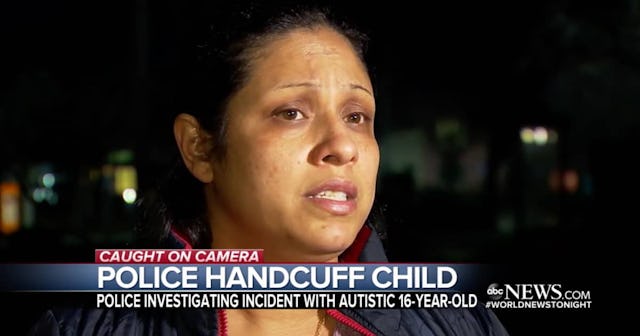16-Year-Old Boy With Autism Handcuffed By Cops While Having A Seizure

Cops handcuffed a 16-year-old boy with autism after he had an epileptic attack in a restaurant bathroom
Police officers in California are facing intense criticism for their reaction to an epileptic teen with autism who reportedly suffered a series of seizures in the restroom of a Fresno-area El Pollo Loco fast-food eatery. According to Lourdes Ponce, the mother of 16-year-old David Ramos, cops forcibly removed her son from the restaurant — not even removing the restraints when the boy began to vomit.
As Lourdes told ABC News, her family had just gotten out of a doctor’s appointment where her son was treated for epileptic seizures. They stopped at the fast-food chain, where her son’s seizures returned. “I stood outside the door, I heard him hit the floor, I tried to open the door but it was locked,” she told the news outlet. “That’s when I asked for help. We called paramedics for help, we did not call the police. He was not hurting anybody; he was having a seizure.”
Instead of paramedics, however, police arrived first on the scene and handcuffed David. In a disturbing clip released by KFSN News, Lourdes can be seen pleading with police as they attempt to put David in the back of a police cruiser. “He has autism, he has epilepsy, stop it!” she cries out in the video. David is also distraught, yelling that he doesn’t want to be in handcuffs because he hasn’t done anything wrong.
At one point, David is so upset he begins vomiting. And while video footage suggests the cops consider removing the teen’s wrist restraints, David is ultimately left in handcuffs for the duration of the incident. “[The police] saw that my son was throwing up,” Lourdes revealed, “and instead of helping him so that he wouldn’t choke on his vomit, they had him on the ground in handcuffs.”
David also complained of leg pain, after which he slumped to the ground and appears unresponsive.
Still desperate to convince the cops to release David’s restraints, Lourdes kept her cool enough to retrieve medical papers from her car that confirmed her son’s medical history. “After I showed the paperwork, EMS was able to treat him and take him to the hospital,” she said.
After news broke of the Ponces’ incident, the story not surprisingly went viral — fueled largely by shock and outrage. In response, Fresno Police shared an edited 11-and-a-half-minute bodycam video of the altercation as well as audio from the initial 9-1-1 call. In the audio, David’s sister tells the operator her brother is “being very combative” and “he’s just 16 years old and he’s in the restroom and not responding.”
The bodycam footage shows the family begging police not to restrain the boy and showing them putting their arms around him in an attempt to protect him.
According to police, they handcuffed David to “prevent him from harming himself or others,” as he had reportedly threatened to kill his family in his agitated state. “I feel like Fresno PD did their job and did what they’re supposed to, but maybe things could’ve been handled a little differently,” Stephanie Ramirez, founder of the Fresno Autism Network, told ABC 7.
This is why it should be imperative for officers to receive more training on how to handle a crisis when it involves someone with special needs, Ramirez underscored. “Something like autism is what we call an invisible disability,” she explained. “It’s not like other disabilities where you need accommodations like a wheelchair. And these kids vary across the spectrum.”
As for David’s state when police arrived, Ramirez said it’s very likely he was in what is referred to as a “post-epileptic phase” — which is to say he was still adjusting after the seizures he’d been treated for at his doctor’s office. “That’s the time after having a seizure, like their recovery time. The kids might look coherent, but they might not be back. Sometimes it might take them a few minutes to a few hours to be back to their normal state of being,” she said.
Despite insisting they acted in accordance with the law and out of concern for the wellbeing of David and those around him, Fresno Police issued a statement saying the case is under administrative review: “The review will include the examination of all the information pertaining to the officer’s contact including Body Worn Cameras.”
At the time this article was written, David was still recovering from his seizures at Valley Children’s Hospital in Fresno.